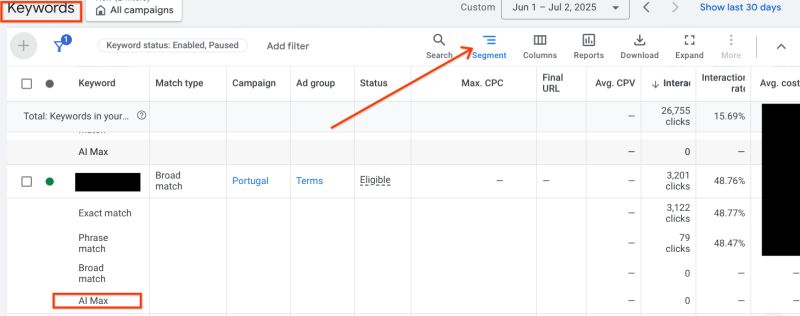Social Signals
Google Ads rolls out “AI Max” search match type
AI Max now appears as a distinct search match type in reporting dashboards, giving marketers a new layer of visibility into performance data that previously lived in a black box.
How to find it. Users with AI Max-enabled campaigns can now segment their Keywords tab by “Search terms match type” to view performance specifically attributed to AI Max. That data includes critical metrics like ROAS, CPA, CPC, and revenue.

Zoom in. The AI Max match type covers queries surfaced through Google’s latest automation, blending:
- Broad match logic
- Creative asset signals
- Landing page content
This approach allows campaigns to expand reach beyond predefined keyword lists — often drawing criticism from advertisers concerned about cost control and relevance.
Why we care. This change marks a notable shift in how advertisers can analyze search campaigns powered by Google’s automation. By categorizing AI Max as its own match type, marketers can now analyze its performance separately from traditional match types — unlocking clearer insights into what’s driving results.
This helps teams make data-backed decisions about whether AI Max is improving efficiency or simply increasing costs, and ultimately allows for smarter budget allocation in an increasingly automated ad ecosystem.
Part of a broader beta rollout. This update is part of the AI Max for Search campaigns beta, first announced in May. The beta gives advertisers the option to enable or disable AI Max within standard Search campaigns, offering flexibility to test the feature before full-scale adoption. The introduction of match type-level reporting is one of several visibility improvements included in the rollout.
What they’re saying. Senior Google Ads Campaigns Specialist Aleksejus Podpruginas was among the first to flag the update:
- “We can finally start to analyze how AI Max actually performs — and compare it clearly against traditional match types.”
Head of Google Ads Thomas Eccel adds that this transparency is key for advertisers deciding whether AI Max is delivering value:
- “It’s expensive at first, especially when shifting from Max Clicks or manual CPC to conversion-based bidding. But that’s typical during bid strategy transitions.”
The bottom line. Google isn’t just automating campaign targeting — it’s slowly making automation more measurable. With AI Max now treated as a formal match type in reporting, advertisers are better equipped to decide when and where AI belongs in their search strategies.
Search Engine Land is owned by Semrush. We remain committed to providing high-quality coverage of marketing topics. Unless otherwise noted, this page’s content was written by either an employee or a paid contractor of Semrush Inc.
#Google #Ads #rolls #Max #search #match #type

